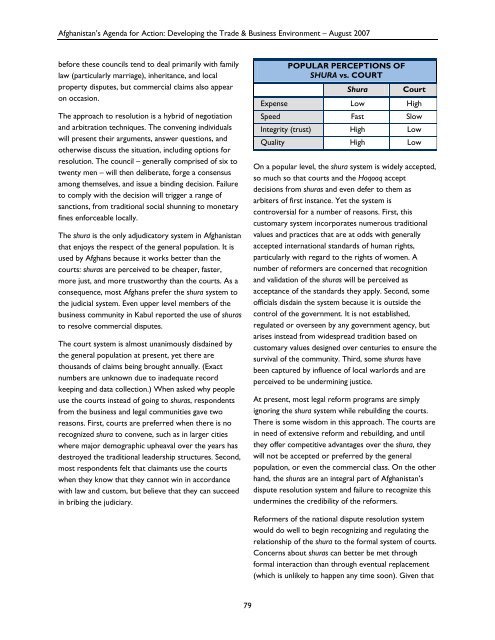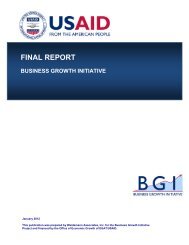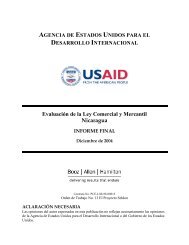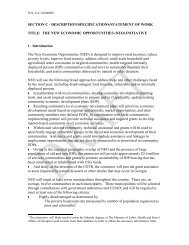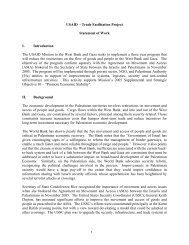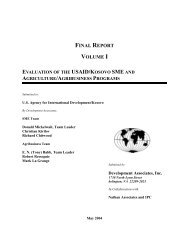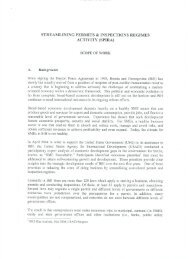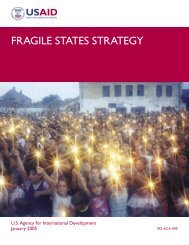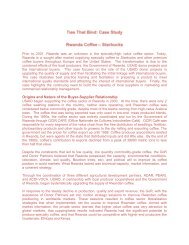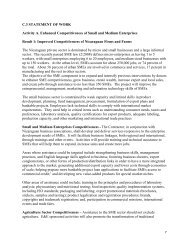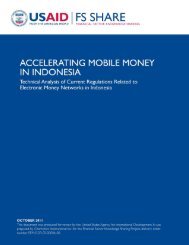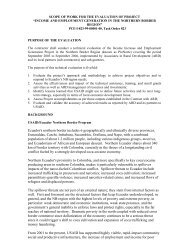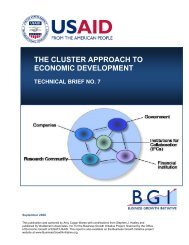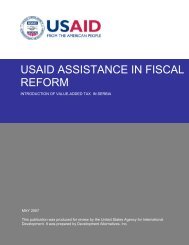Afghanistan’s <strong>Agenda</strong> <strong>for</strong> <strong>Action</strong>: Developing the Trade & Business Environment – August 2007be<strong>for</strong>e these councils tend to deal primarily with familylaw (particularly marriage), inheritance, and localproperty disputes, but commercial claims also appearon occasion.The approach to resolution is a hybrid of negotiationand arbitration techniques. The convening individualswill present their arguments, answer questions, andotherwise discuss the situation, including options <strong>for</strong>resolution. The council – generally comprised of six totwenty men – will then deliberate, <strong>for</strong>ge a consensusamong themselves, and issue a binding decision. Failureto comply with the decision will trigger a range ofsanctions, from traditional social shunning to monetaryfines en<strong>for</strong>ceable locally.The shura is the only adjudicatory system in Afghanistanthat enjoys the respect of the general population. It isused by Afghans because it works better than thecourts: shuras are perceived to be cheaper, faster,more just, and more trustworthy than the courts. As aconsequence, most Afghans prefer the shura system tothe judicial system. Even upper level members of thebusiness community in Kabul reported the use of shurasto resolve commercial disputes.The court system is almost unanimously disdained bythe general population at present, yet there arethousands of claims being brought annually. (Exactnumbers are unknown due to inadequate recordkeeping and data collection.) When asked why peopleuse the courts instead of going to shuras, respondentsfrom the business and legal communities gave tworeasons. First, courts are preferred when there is norecognized shura to convene, such as in larger citieswhere major demographic upheaval over the years hasdestroyed the traditional leadership structures. Second,most respondents felt that claimants use the courtswhen they know that they cannot win in accordancewith law and custom, but believe that they can succeedin bribing the judiciary.POPULAR PERCEPTIONS OFSHURA vs. COURTShuraCourtExpense Low HighSpeed Fast SlowIntegrity (trust) High LowQuality High LowOn a popular level, the shura system is widely accepted,so much so that courts and the Hoqooq acceptdecisions from shuras and even defer to them asarbiters of first instance. Yet the system iscontroversial <strong>for</strong> a number of reasons. First, thiscustomary system incorporates numerous traditionalvalues and practices that are at odds with generallyaccepted international standards of human rights,particularly with regard to the rights of women. Anumber of re<strong>for</strong>mers are concerned that recognitionand validation of the shuras will be perceived asacceptance of the standards they apply. Second, someofficials disdain the system because it is outside thecontrol of the government. It is not established,regulated or overseen by any government agency, butarises instead from widespread tradition based oncustomary values designed over centuries to ensure thesurvival of the community. Third, some shuras havebeen captured by influence of local warlords and areperceived to be undermining justice.At present, most legal re<strong>for</strong>m programs are simplyignoring the shura system while rebuilding the courts.There is some wisdom in this approach. The courts arein need of extensive re<strong>for</strong>m and rebuilding, and untilthey offer competitive advantages over the shura, theywill not be accepted or preferred by the generalpopulation, or even the commercial class. On the otherhand, the shuras are an integral part of Afghanistan’sdispute resolution system and failure to recognize thisundermines the credibility of the re<strong>for</strong>mers.Re<strong>for</strong>mers of the national dispute resolution systemwould do well to begin recognizing and regulating therelationship of the shura to the <strong>for</strong>mal system of courts.Concerns about shuras can better be met through<strong>for</strong>mal interaction than through eventual replacement(which is unlikely to happen any time soon). Given that79
Afghanistan’s <strong>Agenda</strong> <strong>for</strong> <strong>Action</strong>: Developing the Trade & Business Environment – August 2007the shura system is here to stay, but that it mayperpetuate undesirable practices or be subject toimproper influence, Afghanistan should build aninterface <strong>for</strong> recognizing and possibly even <strong>for</strong>malizingthe system. At the initial stages, this should includeseveral components:1. Jurisdiction. The law should set <strong>for</strong>th exclusiveand non-exclusive jurisdiction over subject matterthat can be handled by shuras. Parties should befree to choose the <strong>for</strong>um they prefer, with thecourts as the default <strong>for</strong>um when they cannotagree. (In fact, this is already the case.) Placingsome matters (capital crimes or <strong>for</strong>ced marriage,<strong>for</strong> example), within the exclusive jurisdiction ofthe courts will not necessarily stop shuras fromhandling them, but can be used to judicialen<strong>for</strong>cement of any decisions outside the subjectmatter jurisdiction of the shuras. 1252. En<strong>for</strong>ceability. The strength of the shura systemis that it is built upon agreement and consensus.Consensus leads to implementation; en<strong>for</strong>cementis needed only if one of the parties objects to theultimate outcome. One of the weaknesses is thatindividuals can be subjected to the shura systemwithout actual consent, especially in the case of<strong>for</strong>ced marriages, or where there is no viablealternative in the jurisdiction. To limit suchinjustice, en<strong>for</strong>cement should be permitted onlywhen the parties have <strong>for</strong>mally signed agreementsin which they accept the shura decision as binding.This requires increased <strong>for</strong>malization of the shurasystem, allowing <strong>for</strong> greater oversight andregulation.3. Appeals. The various codes of civil andcommercial procedure should expressly provide<strong>for</strong> appeal from shura decisions and set <strong>for</strong>th thebasis of the appeal. This can be based upon appealfrom arbitrations, which are similar, but should beexpanded to include express permission to appealbased on violations of human rights orconstitutional protections.125For example, in attempting to en<strong>for</strong>ce civil rights law inthe United States, courts refused to en<strong>for</strong>ce illegalagreements that <strong>for</strong>bade the sale of homes to minorities.When a community attempted to apply sanctions in theagreements or to stop the sale, the courts simply did notrecognize the validity of the agreements and would notpermit judicial en<strong>for</strong>cement. These traditionaldiscriminatory agreements thus lost all <strong>for</strong>ce of law.Clearly, designing an entire system <strong>for</strong> incorporation ofthe shura system into the <strong>for</strong>mal judicial system isbeyond the scope of this assessment. There are,however, numerous legal standards and models thatcan be used to capture the strengths of this widelyaccepted institution while addressing the weaknesses.Appellate PracticeAppellate practice has an apparent inefficiency. Appealscan be conducted as a virtual de novo trial. In moreestablished systems, this is not appropriate – appealsshould be based only on those matters expressly atissue in the case and should focus on proper applicationof the law to the facts, or proper application ofprocedural rules. There should be no new evidence ornew arguments on appeal. Otherwise, the system canbe come mired in interminable delays.Afghanistan is not ready to re<strong>for</strong>m this facet ofappellate practice. Although the law appears to limitwhat can be presented on appeal, it is not practical toen<strong>for</strong>ce this <strong>for</strong> a very simple reason: the trial record –if one exists at all – is so sparse as to provide nomeaningful basis <strong>for</strong> review. Consequently, it makessense that parties to a dispute would need to presentarguments, evidence, research and other inputconstituting the better part of the original trial in order<strong>for</strong> the appellate courts to understand the nature ofthe appeal.Eventually, appellate practice should be re<strong>for</strong>med tocomply with the law. Part of that re<strong>for</strong>m should includeinsistence on better records from the courts of firstinstance, with appropriate sanctions <strong>for</strong> failure toprovide them. Until the courts of first instance canproduce such records, however, it will be difficult tobring about meaningful change.Administrative ClaimsClaims by or against the state and its agencies areexpressly handled by the court system, not by separateadministrative bodies. In theory, Afghanistan hasspecialized judges who can handle such cases moreeffectively; in practice the specialization does not yetexist. Moreover, there are no separate regulations orcourt rules addressing the particularities ofadministrative law, such as exhaustion of administrative80


